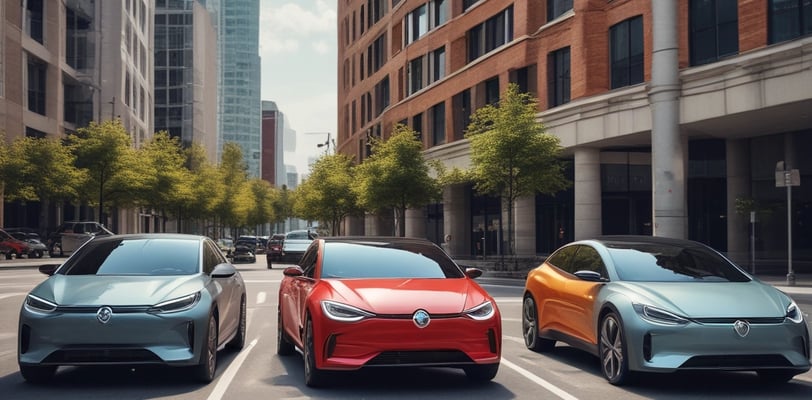"Affordable Electric Cars Compared: Which EV Fits Your Budget and Lifestyle?"
Discover the ultimate comparison guide for affordable electric vehicles! From range and pricing to features and charging capabilities, this guide breaks down the top options in the EV market for budget-conscious buyers.
BLOG POST
evnovatech.com
12/22/20243 min read


"Affordable Electric Cars Compared: Which EV Fits Your Budget and Lifestyle?"
Affordable Electric Cars Comparison Guide: Find Your Perfect Ride.
The electric vehicle (EV) market is buzzing with options, but navigating it can be daunting—especially if you’re on a budget. Thankfully, affordable EVs are becoming more accessible, offering impressive features without breaking the bank. Whether you’re looking for a compact city car or a family-friendly SUV, this guide will help you find an electric vehicle that suits your needs and budget.
1. Why Consider an Affordable EV?
Affordable electric cars are no longer bare-bones vehicles. They offer:
Cost Savings: Lower operating and maintenance costs compared to gas-powered cars.
Environmental Benefits: Reduced emissions to combat climate change.
Government Incentives: Tax credits and rebates that make EVs even more budget-friendly.
2. Key Factors to Consider
When shopping for an affordable EV, focus on these essential factors:
Price Range: Determine your budget, factoring in incentives and potential savings.
Range: Consider how far you need to drive on a single charge.
Charging Infrastructure: Check the availability of charging stations in your area.
Features: Look for advanced safety features, infotainment systems, and cargo space.
3. Top Affordable Electric Cars in 2024
Here’s a detailed comparison of the best budget-friendly EVs currently on the market:
1. Chevrolet Bolt EV
Price: Starting at $26,500 (after federal incentives)
Range: 259 miles per charge
Key Features: Spacious interior, 10.2-inch infotainment screen, fast DC charging capability
Pros: Excellent range for the price, smooth handling
Cons: Limited cargo space
2. Nissan Leaf
Price: Starting at $28,040 (after incentives)
Range: Up to 212 miles per charge (SV Plus model)
Key Features: ProPILOT Assist, e-Pedal technology, compact size for city driving
Pros: Proven reliability, affordable base model
Cons: Shorter range on entry-level models
3. Hyundai Kona Electric
Price: Starting at $33,550
Range: 258 miles per charge
Key Features: Modern design, high-tech safety features, excellent warranty
Pros: Long range, feature-rich interior
Cons: Slightly higher price point
4. Tesla Model 3 (Standard Range Plus)
Price: Starting at $37,990
Range: 272 miles per charge
Key Features: Autopilot, over-the-air software updates, sleek minimalist design
Pros: Access to Tesla’s Supercharger network, high resale value
Cons: Higher base price compared to competitors
5. Volkswagen ID.4
Price: Starting at $38,995
Range: 275 miles per charge
Key Features: Spacious cabin, intuitive tech features, all-wheel drive option
Pros: Family-friendly, robust range
Cons: Heavier build affects performance
4. Best Value for Money
If you’re looking for the most bang for your buck, the Chevrolet Bolt EV stands out. With its competitive pricing and long range, it’s a great option for first-time EV buyers. However, if you prioritize advanced technology and access to a fast-charging network, the Tesla Model 3 is worth the extra investment.
5. Charging Costs and Time
Charging your EV is cheaper than filling up a gas tank, but costs vary:
Home Charging: Most affordable, with Level 2 chargers costing around $500 to install.
Public Fast Charging: More expensive but ideal for road trips.
For example, charging a Nissan Leaf at home can cost as little as $5 for a full charge, while public charging might range from $10-$20 depending on location.
6. Government Incentives
To make EVs more accessible, many governments offer financial incentives:
Federal Tax Credit: Up to $7,500 in the U.S.
State Rebates: Additional savings depending on your location.
Utility Discounts: Some energy providers offer reduced rates for EV owners.
Check eligibility and apply early to maximize your savings.
7. Future Trends in Affordable EVs
The market is evolving rapidly, with new models like the Ford Explorer EV and Honda Prologue set to compete in the affordable segment. Additionally, battery technology improvements promise better range and lower costs in the coming years.
FAQ
Q: How do I choose the right EV for my needs? A: Consider your driving habits, budget, and must-have features. Test drive a few models to find the best fit.
Q: Are affordable EVs reliable? A: Yes, modern EVs are highly reliable and require less maintenance than traditional vehicles.
Q: How long do EV batteries last? A: Most EV batteries come with an 8-year or 100,000-mile warranty and can last much longer with proper care.
Q: Is it expensive to install a home charger? A: Installing a Level 2 charger costs around $500-$1,200 but is a worthwhile investment for convenience.
Q: Can I drive an EV on long trips? A: Yes, many EVs offer ranges over 250 miles, and fast-charging networks make long trips feasible.
Final Thoughts Affordable electric vehicles are transforming the automotive landscape, making sustainable driving accessible to more people than ever. With this guide, you’re equipped to find an EV that fits your lifestyle and budget. Start your journey toward greener, cheaper, and smarter driving today!
